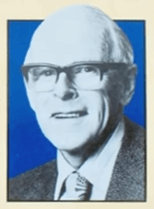Denis Parsons Burkitt facts for kids
Quick facts for kids
Denis Parsons Burkitt
|
|
|---|---|
 |
|
| Born | 28 February 1911 Enniskillen, Ireland
|
| Died | 23 March 1993 (aged 82) Gloucester, England
|
| Nationality | British |
| Known for | Burkitt's lymphoma, Cancer |
| Awards | Paul Ehrlich and Ludwig Darmstaedter Prize (1972) Charles S. Mott Prize (1982) Buchanan Medal (1992) Fellow of the Royal Society |
| Scientific career | |
| Fields | Surgeon |
Denis Parsons Burkitt (born in 1911, died in 1993) was an important Irish doctor. He was a surgeon who helped us understand a lot about health. He discovered a type of childhood cancer now called Burkitt's lymphoma. He also found that eating enough fibre can help prevent some serious diseases.
Contents
Denis Burkitt's Life Story
Denis Burkitt was born in Enniskillen, County Fermanagh, Ireland. His father was an engineer. When Denis was eleven, he lost his right eye in an accident. He went to school in Enniskillen and England.
In 1929, Burkitt started studying engineering at Trinity College, Dublin. But he soon decided he wanted to be a doctor instead. He switched to medicine and finished his studies in 1935. In 1938, he became a fellow of the Royal College of Surgeons of Edinburgh. He married Olive Rogers in 1943.
During World War II, Burkitt worked as a doctor for the army. He served in England, Kenya, and Somaliland. After the war, he decided to work in developing countries. He moved to Uganda and lived there until 1964.
Burkitt was also the president of the Christian Medical Fellowship. He often wrote about how faith and medicine connect. In 1979, he was made an honorary fellow of Trinity College Dublin. He received a special award called the Bower Award and Prize in 1992. Denis Burkitt died in 1993 at the age of 82.
Amazing Discoveries in Medicine
Denis Burkitt made two very important discoveries in medical science. Both were based on his experiences while working in Africa.
Discovering a New Cancer
His first big discovery was about a type of cancer that affects children. This cancer is now named Burkitt's lymphoma after him.
In 1957, Burkitt saw a child with strange swellings on their jaw. He then saw another child with a swollen face. This made him curious, so he started looking into these jaw tumors. He found that these tumors were common in children in Uganda. They were also linked to other unusual tumors in different parts of the body.
Burkitt realized that all these different tumors were actually the same type of cancer. He published his findings, and this newly identified cancer became known as "Burkitt's lymphoma." He also mapped out where this cancer was found geographically. In 1970, Burkitt and Dennis Wright wrote a book called Burkitt's Lymphoma.
The Importance of Fibre
Burkitt's second major discovery happened after he returned to Britain. He compared the types of diseases he saw in African hospitals with diseases common in Western countries. He noticed that many diseases common in the West were rare in Africa.
He concluded that many Western diseases were caused by diet and lifestyle. He wrote a book called Don't Forget Fibre in your Diet, which became a huge success around the world.
Burkitt suggested that eating more fibre could lower the risk of colorectal cancer. He saw that people in African countries, who ate more fibre, had much lower rates of this cancer than people in Western countries. While some studies have been debated, more recent research supports the idea that fibre from whole grains can protect against cancer.
Research also suggests that a diet high in fibre can help protect against other diseases. These include heart disease and diabetes.
Publications by Burkitt
Books
- Kellock B, Burkitt D. P. The Fibre Man: The Life-story of Dr. Denis Burkitt: Lion Pub.; 1985.
 | Georgia Louise Harris Brown |
 | Julian Abele |
 | Norma Merrick Sklarek |
 | William Sidney Pittman |

